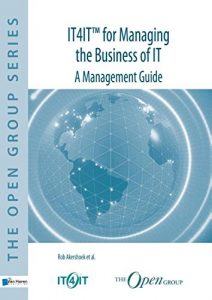The IT4IT Management Guide provides guidance on how the IT4IT Reference Architecture can be used within an IT organization to manage the business of IT. It is designed to provide a guide to business managers, CIOs, IT executives, IT professionals, and all individuals involved or interested in how to transition an IT organization to become a Lean and Agile IT service provider.
After reading this document you should be able to:
•Understand why the IT4IT approach is needed to improve the performance of the IT function; and support the business to leverage new IT in the digital age
•Understand the vision, scope, and content of the IT4IT Reference Architecture (from a high-level perspective)
•Understand the benefits of using the IT4IT Reference Architecture within the IT function
•Initiate the first steps to implement the IT4IT standard in your own IT organization
The audience for this Management Guide is:
•CIOs and other IT executive managers who would like to transform their IT organization to support end-to-end value streams
•Senior leaders and executives in the business and IT responsible for how IT is organized, managed, and improved
•Enterprise Architects involved in the implementation of IT management solutions within the IT organization
•IT professionals and consultants involved in the transition of their organizations to a new streamlined IT factory
After reading this document you should be able to:
•Understand why the IT4IT approach is needed to improve the performance of the IT function; and support the business to leverage new IT in the digital age
•Understand the vision, scope, and content of the IT4IT Reference Architecture (from a high-level perspective)
•Understand the benefits of using the IT4IT Reference Architecture within the IT function
•Initiate the first steps to implement the IT4IT standard in your own IT organization
The audience for this Management Guide is:
•CIOs and other IT executive managers who would like to transform their IT organization to support end-to-end value streams
•Senior leaders and executives in the business and IT responsible for how IT is organized, managed, and improved
•Enterprise Architects involved in the implementation of IT management solutions within the IT organization
•IT professionals and consultants involved in the transition of their organizations to a new streamlined IT factory






